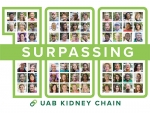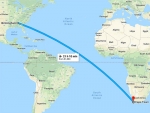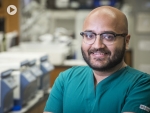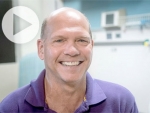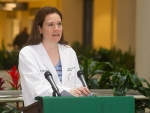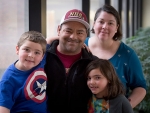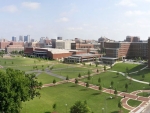Displaying items by tag: kidney chain
In 2014, Berwager volunteered to donate one of her kidneys to a friend who was suffering from lupus, and who had kidney failure.
Tagged under
High-tech medicine and human kindness combine in UAB’s ongoing kidney chain, a series of transplant surgeries that have given 101 people a new lease on life.
Tagged under
After providing UAB's School of Medicine with HIV-positive deceased donor transplant protocols, UAB aims to return the favor to Groote Schuur Hospital in South Africa by providing paired exchange transplant training
Tagged under
A TEDx Birmingham talk by Jayme Locke inspires an Alabamian to donate altruistically and save more lives.
Tagged under
UAB has a new, quick way to learn about what’s happening on campus. Watch "UAB This Week" every Friday morning for the latest stories you need to know.
Tagged under
Divyank Saini is one of 17 employees who interpret lab samples to determine whether living- and deceased-donor transplants are possible. Now he is a donor in the world’s longest kidney transplant chain.
Tagged under
Meet a family bound not by blood or name, but by their kidneys in the world’s longest living-donor kidney transplant chain. Discover how science and human kindness come together to save lives.
Tagged under
North Carolina resident Jerry Phillips has known since 2001 that he would one day need a kidney transplant. Fourteen years later, his need was fulfilled by a stranger and his transplant surgery performed by a friend.
Fifty-first transplant means 102 total surgeries have been performed since December 2013 as the nation’s longest-ever chain continues to grow.
Tagged under
Award given annually to top young professionals in Birmingham based on their contribution to their company, impact on the business world and role in their community.
The UAB kidney chain, which began December 2013 and expects more transplants in January 2015, ‘showcases the power of the human spirit in every aspect.’
Tagged under
Tagged under
- campaign for uab
- kidney chain
- office of global engagement
- cancer and radiology
- honors college
- school of medicine
- school of health professions
- school of education
- collat school of business
- school of public health
- school of nursing
- school of engineering
- abroms engel institute for the visual arts
- college of arts and sciences
- science and technology honors program
- southern research institute
- neuroscience
- center for information assurance and joint forensics research
- department of computer science
- department of criminal justice
- division of pediatric infectious diseases
- department of pediatrics
- school of optometry
- school of dentistry
- comprehensive diabetes center
- uab medicine
- department of nutrition sciences
- department of psychology
- department of anesthesiology and perioperative medicine
- alys stephens center
- artplay
- oneal comprehensive cancer center
Since December, 21 living donor kidney transplants that have taken place at UAB are connected as donors “pay it forward” for a recipient to keep the chain going, and more transplants are scheduled for July.
Tagged under
Physicians and staff spent three days and nights in-hospital during the South’s recent winter storm to ensure success of a kidney transplant chain that stands at 13 and counting.
Tagged under

